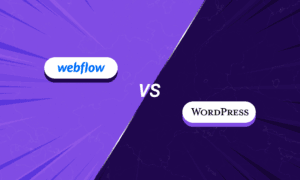Congrats on establishing your business! You’ve gathered your team, sorted services, and organized products. Yet, a crucial element may be absent — a dedicated business website. Nowadays, nearly every business, regardless of size, has its own website. This not only attracts clients but embodies your business essence. Allow us to reveal an incredible strategy for crafting your website and establishing your online footprint.
When it comes to creating a website for your business, the choice of the right Content Management System (CMS) holds paramount importance. Two prominent CMS options are Drupal and WordPress, each possessing distinct strengths catering to varying business needs. This article dissects the key disparities between Drupal and WordPress to empower you in making an enlightened choice for your business.
User-Friendly Experience
In this realm, WordPress takes the lead with its user-friendly interface and intuitive design. Even individuals with limited tech proficiency can swiftly grasp WordPress basics, rendering it ideal for resource-constrained startups and small businesses.
In contrast, Drupal presents a steeper learning curve and suits businesses with a dedicated development team or technical know-how. While offering superior flexibility and scalability, it might not be optimal for those seeking swift and effortless setup.
Versatility and Personalization
For those valuing customization, Drupal emerges as the definitive winner. Its robust structure and expansive modules enable businesses to craft intricate, distinctive websites tailored precisely to their demands. Drupal suits well for large enterprises and organizations with intricate requisites.
WordPress also offers substantial customization via its plethora of themes and plugins. It caters aptly to small to medium-sized businesses desiring a harmony between simplicity and personalization.
Security
In security matters, both Drupal and WordPress have made significant advancements over time. Yet, Drupal is often perceived as more secure out of the box due to its emphasis on enterprise-grade security attributes. Its dedicated security team and stringent coding standards contribute to a safer digital environment.
WordPress, as the more widely adopted platform, becomes a prime target for hackers. Nevertheless, this doesn’t inherently imply lesser security. Regular updates, robust passwords, and reputable plugins can uphold WordPress security.
Performance
Drupal boasts exceptional performance prowess, particularly for large-scale websites managing heavy traffic. Its caching mechanisms and optimization choices lead to quicker load times and seamless user experiences.
WordPress, while optimized for performance, might necessitate extra efforts to handle high visitor volumes. However, a range of caching plugins and performance enhancement tools are accessible to elevate website speed.
Community Support
WordPress enjoys a sprawling and active global community of users, developers, and contributors. This translates to abundant resources, tutorials, and support. It’s an excellent fit for businesses reliant on off-the-shelf solutions.
Drupal also harbors a devoted community, albeit relatively smaller than WordPress. However, for intricate issues and enterprise-level assistance, Drupal’s community stands ready to offer adept guidance.
The Ultimate Choice: WordPress or Drupal?
To conclude, the decision between Drupal and WordPress hinges on your business’s distinct prerequisites, budget, and technical proficiency. If you prioritize ease, swift setup, and a wide range of themes/plugins, WordPress stands as an excellent choice. Conversely, if you seek unparalleled personalization, security, and performance for expansive projects, considering Drupal development services is wise.
Irrespective of your decision, both platforms possess merits and can aid in erecting a sturdy online identity for your business. Hence, take your time, assess your needs, and opt for an informed decision aligning with your long-term objectives. Best of luck in crafting your website!

































